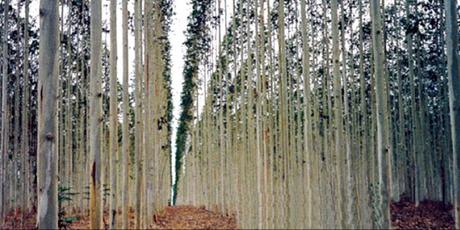GR: Forest plantations are just another form of deforestation. A process that is harmful to nature and humanity. This is another telling example of a federal agency (the U. S. Department of Agriculture) favoring for-profit enterprises over nature conservation and protection of biodiversity and ecosystem stability.

“The U.S. Department of Agriculture (USDA) proposed approval in April 2017, releasing a draft Environmental Impact Statement (dEIS) for public comment. This comment period ended on July 5. The GE eucalyptus trees are engineered to tolerate freezing temperatures in order to greatly expand their growing range. The approval of these GE trees could set a precedent for future approval of GE forest trees such as poplar and pine.
“In the dEIS, USDA downplayed or ignored the significant risks posed by these novel GE trees. The agency conservatively predicts commercial GE eucalyptus plantations would cover more than one million acres across seven southern states—from coastal South Carolina to eastern Texas. This would have devastating consequences across this region, which is home to a number of the poorest counties in the country, as well as some of the most biodiverse ecosystems in the world. The region is already precariously threatened by climate change and sprawl.”
“GE eucalyptus plantations spread across the South would be a disaster,” stated Dr. Marti Crouch, consulting scientist for the Center for Food Safety. “Some non-GE eucalyptus species have already become invasive and are degrading natural areas. Plants and animals, including endangered species, will be unable to find suitable habitats within landscapes dominated by GE eucalyptus. Approving these trees is a terrible idea.”
“Just last month in Portugal, catastrophic wildfires that killed dozens were directly blamed on eucalyptus plantations that comprise more than one-quarter of Portugal’s tree cover. In January, Chile experienced the worst wildfires in its history. In both cases, eucalyptus monocultures—well-known for being extremely flammable and depleting ground water—contributed to dry conditions that combined with heat waves to create the perfect setting for wildfire. Already the U.S. South is experiencing frequent droughts and heat waves, and climate change forecasts predict more of the same. The dEIS made no mention of climate change impacts in its proposed approval of these GE eucalyptus trees.”
“GE eucalyptus is being pushed for commercialization to help feed the skyrocketing demand for trees for biomass electricity,” said Ruddy Turnstone, GE Trees Campaigner for Global Justice Ecology Project, and a resident of Florida in the region targeted for GE eucalyptus plantations. “But biomass is a false solution to climate change. Not only is it a major polluter, climate-stabilizing Southeastern forests are being decimated for the booming European biomass industry. GE eucalyptus plantations will only escalate this deforestation.”
“USDA’s assurances that GE eucalyptus will not escape into native forests are fatally undercut by the U.S.’s 30-year experiment with GE crops, which have escaped containment over and over again, despite industry and USDA claims they would not. GE trees are even more likely to escape and spread than GE crops, given their much longer lives, pollination distances and the unpredictable, changing conditions that can occur over the lifespan of the trees.” –Center for Food Safety (250,000+ Oppose USDA Proposal to Approve First-Ever Genetically Engineered Forest Tree)

